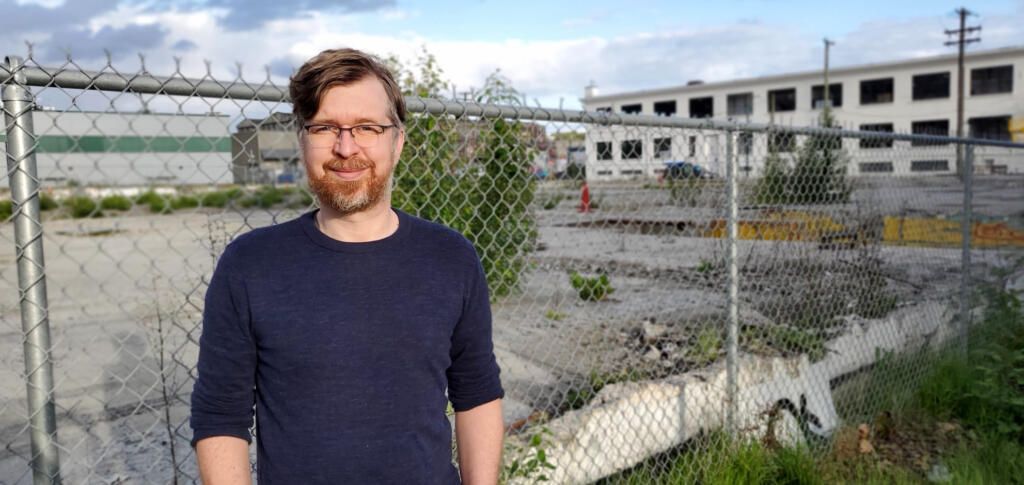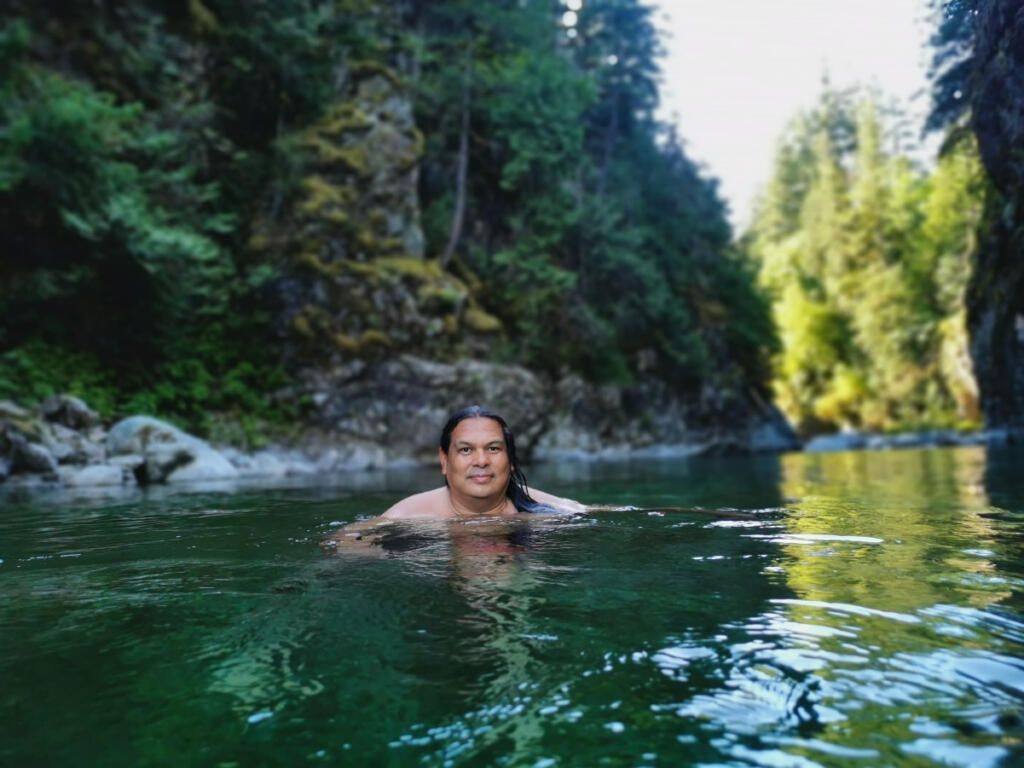‘Reciprocal relationship with our lands’
It Stops Here: Standing Up for Our Lands, Our Waters, and Our People
by Rueben George with Michael Simpson
Toronto: Penguin Random House/Allen Lane, 2023
$34.00 / 9780735242807
Reviewed by Kenneth Favrholdt
*

It Stops Here is a declaration of healing from hurt and pain by both Indigenous and non-Indigenous peoples. As Rueben George ends his book, “We will no longer allow Canada to treat Indigenous Peoples the way it has.” Although this book centres on the health of the Tsleil-Waututh Nation of the southwest coast of British Columbia, and the life of Rueben George, the big story is “how our people took a stand against a multibillion-dollar company and the Canadian government which were trying to build a massive oil pipeline across our lands and waters without our consent…”
Two forewords, by Winona LaDuke and Phil Lane Jr., set the tone for this autobiographical account of Rueben George’s trials as a young man to his growth to become a leader of his people in his lifelong goal of regaining NƏcƏmat, – “the interrelatedness of all beings” — “the spiritual realm from which everything that has a spirit comes.” “The story I want to tell,” states George, “is the story of our people and our reciprocal relationship with our lands and waters dating back to our First Mother.”

George belongs to the Tsleil-Waututh people, the People of the Inlet, who for thousands of years have lived along Burrard Inlet, the site of present Vancouver. Across the inlet from the George family’s home village, Whey-ah-whichen, is the Westridge Marine Terminal. The terminus of the Trans Mountain Pipeline started in the 1950s “where bitumen and other fossil fuel products from the Alberta tar sands are loaded onto tankers and shipped through our waters.” The owner of this company since 2018 is now the Government of Canada which is expanding the pipeline and infrastructure in the years to come.
Prior to colonization, in the time before European intrusion, this landscape was bountiful and provided everything the Tsleil-Waututh needed. The Tsleil-Waututh were never conquered but suffered like many First Nations the ravages of disease like smallpox and the trauma of residential schools that Rueben’s grandfather and parents attended. His grandfather didn’t speak a word of English when he arrived at the school. His mother was in residential school from age five to ten.
Rueben was too young to go to residential school, the last in BC closing in 1984. The intergenerational harm however was felt by him, and the violence was transferred laterally – the oppressed became the oppressors. Alcoholism, drug addiction, and abuse became rampant in the community. Says George, “at times in my life, I was ashamed to be First Nations.”
But he had an uncle, Bob George, and other Elders who talked to the young people about smenálh which means “to carry yourself well with good teachings.” Rueben writes “[h]e would tell us that we must walk with pride and respect of our people.” Another teacher was Uncle Len, his mom’s brother.
Rueben describes how prior to colonization, indeed, before the first pipeline was completed in 1953, the inlet was especially productive as a food source for salmon, Dungeness crabs, and clams.
Today, Rueben calls himself a strong, proud First Nations man, together with his mother, nephews and nieces, brothers, sister and his children. “We’re healing as a community, as a family, and as a nation. My family has done Sweat Lodge ceremony together for thirty years now, and we do our Coast Salish ceremonies together too.”
Rueben devotes a chapter to the story of his famous grandfather Chief Dan George, who died when Rueben was eleven years old. But Rueben was close to Dan George, the actor who portrayed Old Lodge Skins in the 1970 western film Little Big Man. Rueben describes Dan’s experience in residential school as brutal but despite all the abuse he lived through, he held onto the teachings. “My grandpa taught our family to love who we are and to be proud of our culture and spirituality,” George says. Dan George’s 1974 poem “Words to a Grandchild” is reproduced. Rueben describes his own healing journey, his counselling, and environmental work, and in business how he has incorporated Chief Dan George’s teachings.
Chief Leonard George was also a major influence on Rueben. Len went to residential school but survived despite the abuse. “Uncle Len encouraged us to incorporate our culture into everything we did.” A little-known fact is that he was instrumental in renovating rundown buildings in Vancouver’s Downtown Eastside.
Rueben describes the Sweat Lodge ceremony which he attributes to saving his life around the age of 21.
I remember crawling into the pitch-black of the Sweat Lodge for the first time. The Elders were pouring water on the lava rocks that were glowing red at the centre of the dome. It got really hot, and I remember thinking, Okay, I can take this. They started praying and saying things, and eventually they told me it was my turn. I asked them what to do and they told me to pray. I asked, “How do I pray?” and they told me to ask for good things in my life and good things for my family. I said, “Who am I asking?” and they told me to ask the ancestors.
This was at a time when Rueben was still drinking. But that was also the time when he decided to be a ceremonial fireman for the Sweat Lodge, “for fourteen years to make sure that I listened and learned before taking on any kind of leadership role.” “Making the fire is a spiritual process and through that process we prepare ourselves spiritually for the Sweat Lodge ceremony. …The idea of Sweat Lodge is to create a ceremonial space that brings us back to the time we were in our mother’s womb, when we had everything we needed.”
The last few chapters relate Rueben’s involvement in the Kinder Morgan pipeline protest. In 2014 he attended Canada’s National Energy Board public hearings on the Trans Mountain expansion, the twinning of the pipeline. The Tsleil-Waututh had only three hours to summarize their 1,200-page assessment report that they submitted as evidence, to “explain the history of our people and our relationship to our lands and waters dating back to time immemorial.” The following year his delegation travelled to Texas to meet the CEO of Kinder Morgan (Richard Kinder) and were quickly rebuffed when Rueben told the AGM meeting the pipeline “was against our law.” Rueben felt sad for the CEO because he thought, “[h]e may be so overcome by the spirit of greed that he may never get to experience the love of NƏcƏmat.”
Rueben recalled a metaphor that Uncle told him:
… Len used to say that a car has four tires, and if you take one of those tires away, the car can no longer run. If we think of ourselves as a car with four tires, one of those tires is physical, one mental, one emotional, and one spiritual. These are the four aspects of our being that need to be nourished and taken care of…. When you take away Spirit and replace it with the greed spirit, people no longer make responsible choices for future generations.
Today, Rueben George is Sundance Chief and manager of the Tsleil-Waututh Nation’s Sacred Trust initiative. A statement on the website explains its mandate to stop the Trans Mountain pipeline and tanker project.
Increased tanker and tug traffic in Burrard Inlet, and the oil spills resulting from the project, will directly affect the TWN community. Construction of the Trans Mountain pipeline will irreparably harm TWN environmental and cultural values.
The Sacred Trust Initiative is grounded in TWN’s culture, spirituality, and law. TWN has a sacred, legal obligation to protect, defend, and steward the water, land, air, and resources in their territory. TWN’s stewardship obligation includes the responsibility to maintain or restore conditions that provide the environmental, cultural, spiritual, and economic foundation for the community to thrive. – Sacred Trust – Protecting Tsleil-Waututh Territory (Accessed Nov. 15, 2023).
The book includes many excellent photographs of Rueben, his family, and events. A map of the places mentioned by Rueben would have been good for readers, especially non-Vancouverites.

The final chapter is an afterword by Michael Simpson, a PhD Lecturer in the School of Geography and Sustainable Development at the University of St. Andrews in Scotland, who spent three years with Rueben learning from him and his family, and sitting in ceremony.
Simpson states, that It Stops Here was written in friendship and ceremony. Importantly, he writes, “[i]n this book Rueben recounts how Indigenous Elders told non-Indigenous environmental leaders at the outset of the struggle against Trans Mountain that if they wanted to work with the local Coast Salish Nations, they would first have to learn about Coast Salish law by attending ceremony.”
Rueben mentions reconciliation and Trudeau’s commitment to that reparation. But Rueben objects to the notion that TMX is part of that. “It becomes clear that reconciliation is just a bullshit word that the government uses to paper over the travesties committed against our people in the past while it continues to uphold the colonial system in the present.”
Simpson emphasizes the point that Rueben makes, “that colonial violence continues to manifest and reproduce itself in part because those who perpetrate colonial violence have not owned up to their own pain, nor taken up their responsibility to do the work they require to heal.”
This is a profound book, part memoir and part call to action, that everyone should read in order to help themselves navigate the problems in our modern world.

*

Kenneth Favrholdt is a freelance writer, historical geographer and museologist with a BA and MA (Geography, UBC), a teaching certificate (SFU), and certificates as a museum curator. He spent ten years at the Kamloops Museum & Archives, five at the Secwépemc Museum and Heritage Park, four at the Osoyoos Museum, and he is now Archivist of Tk’emlúps te Secwépemc. He has written extensively on local history in Kamloops This Week, the former Kamloops Daily News, the Claresholm Local Press, and other community papers. Ken has also written book reviews for BC Studies and articles for BC History, Canadian Cowboy Country Magazine, Cartographica, Cartouche, and MUSE (magazine of the Canadian Museums Association). He taught geography courses at Thompson Rivers University and edited the Canadian Encyclopedia, geography textbooks, and a commemorative history for the Town of Oliver and Osoyoos Indian Band. Ken has undertaken research for several Interior First Nations and is now working on books on the fur trade of Kamloops and the gold rush journal of John Clapperton, a Nicola Valley pioneer and Caribooite. He lives in Kamloops. [Editor’s note: Ken Favrholdt has recently reviewed books by Jo Chrona, Marc G. Stevenson, George H. S. Duddy, Terrance N. James, Mali Bain, Liz Bryan for The British Columbia Review.]
2 comments on “‘Reciprocal relationship with our lands’”